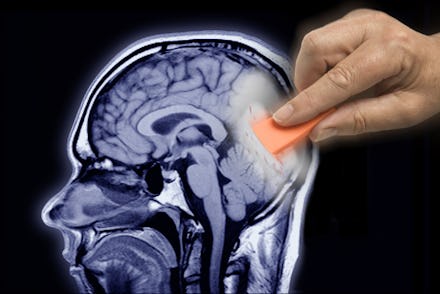One Scientist's Breakthrough Drug Could Actually Delete Bad Memories

Imagine reliving the worst moment of your life. Going through every detail until it's so fresh in your mind that your brain's synapses fire wildly with images from your past. Now imagine taking a pill and forgetting it ever happened.
That's what Cornelius Gross of the European Molecular Biology Laboratory in Italy wants to do. And he knows how to do it. It's not Eternal Sunshine of the Spotless Mind, but it's close.
In March, a research team lead by Gross published a paper in the journal Nature about how the brain erases memories as it makes new ones. It works like weightlifting for the brain: the hippocampus, the thing in your brain that handles memories, naturally favors memories you hold dear and things you've spent time learning. The more you do something, you're literally strengthening your synapses. You know the phrase "practice makes perfect"? That's this.
If you don't keep those connections strong, they weaken to the point of atrophying — and as you get older, they can die completely. Your brain wants to focus on the learning that mattered: the seven languages you use as a diplomat, not the fishing knots you learned in Cub Scouts (unless you're Jacques Cousteau).
There's a double-edged sword here, though. If you spend a lot of time thinking about negative or traumatic thoughts — like your horrible breakup, or when your platoon was ambushed — those synaptic connections stay strong, so you won't, or can't, forget them.
Unless you can find a way to block them. Which is exactly what Gross' team did.
"It was a chance discovery," Gross said over Skype from his office in Rome. "We monitored the strength of synapses in an animal during different behaviors. You could see them strengthen and weaken. ... When we blocked the pathways, there was a rapid loss of strength in the synapses. It seems that within a day — a half hour even — they were losing everything they'd learned during the week."
Gross hypothesized that if he blocked the synapses, it would be like clamping a hose: The memories would still be there, but they wouldn't be accessible. Instead, blocking synapses erased those behaviors, those memories, completely.
"Just because your ears are closed, and you can't hear a word, doesn't block your memory of the word," Gross said. "It's still in your brain. Later you'd know it. But when you block this input, you would get active forgetting, or sudden active loss."
Gross says his drug could potentially be available to consumers someday. If so, it could provide users something previously unheard of, outside science fiction: over-the-counter memory erasure, specifically for learned conditions.
In mice, you can just inject the drug right into the brain, but that isn't a super-popular option in human testing. Humans need mental stimulation before receiving the drug. Think about Jim Carrey reliving his relationship while his mind is being wiped in Eternal Sunshine. In this case, the wiping comes from a drug.
"In humans, you have to expose them to a learning experience — they have to relive it to forget it, like being exposed to spiders if you're afraid of spiders," Gross explained. "So think of traumatic memories, or PTSD, which some veterans have coming back from war. Fortunately, humans are good at virtually recreating experiences, so you could try to re-expose them in a safe, virtual environment. Then you give them the drug to block the pathway."
Paired with psychotherapy, Gross' drug could be used to delete bad memories or other things we've learned. But that doesn't mean we'll be seeing it on the market soon, and that's because of the painstaking and cost-intensive trials between experimenting with genetically engineered mice and buying the pills at CVS.
"It depends on if companies will pick it up," Gross said. He referenced a medication that came before his that works using extinction, or covering memories up by learning the opposite. It didn't go to market. "Clinical trials are extremely expensive, and many of them fail after costing ... billions of dollars. Super-optimistically, it could be 10 years," at minimum, before the drug is on the market.
Why we need this: Your brain, that chemical machine responsible for the greatest breakthroughs and worst fart jokes, is dumping dead weight all the time. A drug like this could let us decide what memories are and aren't worth losing.
It could be used to fix real problems too. Right now, treatment for PTSD is all therapy-based. If Gross is correct, counseling doesn't fully get the job done. If Gross' drug can be brought to market, it could provide relief for the extremely high number of veterans who return from war with post-traumatic stress.
"When people come back from war, they get, in the best case, psychotherapy" — but "that only works in 20% to 30% of cases," Gross said. "Mental issues affect a large fraction of the population. It's not just being anxious. It keeps you from getting out of bed."
Gross's drug wouldn't completely do away with the therapy part. But in the grand tradition of finding a miracle drug, this could be the closest we've come.